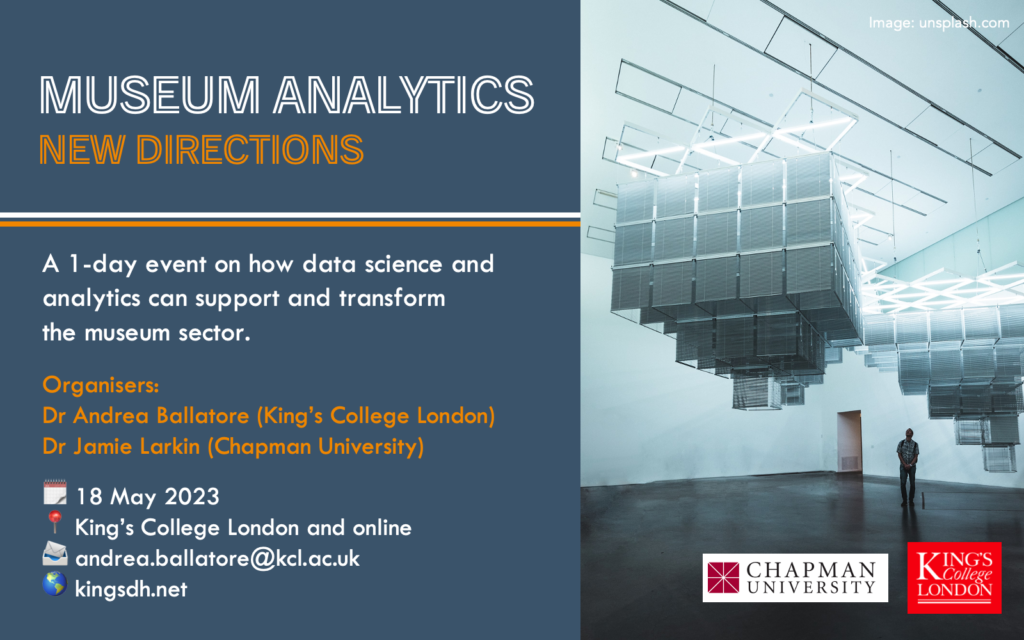
Programme: Museum Analytics: Registration and programme
Call for abstracts
Data science has the capacity to revitalise our understanding of the museum sector, through reframing the history of museum development, charting museum geographies, and highlighting new data relationships in innovative and dynamic ways (e.g. Ballatore & Candlin, 2022). It can also illuminate broader relationships between museums, society, and the wider Creative and Cultural Industries (e.g. Me|Mind, 2021), to help produce more joined-up cultural policy and strategy (Centre for Cultural Value, 2022).
The application of data analytics presents growing opportunities for institutions and researchers across the cultural sector. While museums often use data to develop visitor profiles and drive income generation, there is tremendous scope to leverage data in ways that reimagine the cultural work of the museum and knowledge of the museum sector. Within museums, work has taken place to use data to enhance curatorial decision-making (Tate, 2016), to personalise collections databases (Noehrer et al., 2022), and to enrich and improve visitor experiences (e.g. Villaespesa & Murphy, 2021).
Stemming from the Mapping Museums project (http://www.mappingmuseums.org), this one-day conference seeks to draw together museum studies scholars, data scientists, cultural policymakers, and geographers to discuss and debate the role and scope of museum analytics and to frame the development of this area of research and practice. We seek presentations of 15 minutes that examine new directions and applications for museum analytics. Topics of interest include (but are not limited to):
- Applications of data analytics in new areas of museum practice
- Innovative data collection methods in museums
- Social media analytics and user-generated content
- New methods for audience analytics and profiling
- Data-driven museum marketing
- Artificial intelligence (AI) and museums
- Ethical considerations surrounding data practices and datafication in museums
- Innovative data applications in digital museum contexts
- Museum analytics and cultural policy
- Data science to study collections
- Data vocabularies and linked data for museums
- Data infrastructures and capacity across the museum sector
- Quantitative geographies and histories of museums
- History of data science methods to study museums
Please send an abstract of c300 words outlining your proposed contribution by 20th January 2023 by using this form: https://forms.office.com/r/EYEBFMUdkY
Decisions on abstracts will be made by 20 February 2023. We will select abstracts in terms of relevance and originality, also considering the balance between in-person and online speakers.
The objectives of the event include the development and promotion of a sector-wide agenda and, more modestly, a special issue in an international journal.
The event will be free to all participants, in person and online (£0).
If you have any questions regarding this call, or the suitability of a proposed submission, please contact the conference organisers: andrea.ballatore@kcl.ac.uk and jlarkin@chapman.edu
Chairs
Dr. Andrea Ballatore, King’s College London, UK, andrea.ballatore@kcl.ac.uk
Dr. Jamie Larkin, Chapman University, CA, US, jlarkin@chapman.edu
Organising committee
- Chiara Bonacchi (School of History, Classics and Archaeology and Edinburgh Futures Institute, University of Edinburgh)
- Fiona Candlin (History of Art, Birkbeck, University of London)
- Mark Liebenrood (History of Art, Birkbeck, University of London)
- Oonagh Murphy (Institute for Creative and Cultural Entrepreneurship, Goldsmiths, University of London)
- Alex Poulovassilis (Computer Science and Information Systems, Birkbeck, University of London)
- Peter Wood (Computer Science and Information Systems, Birkbeck, University of London)
- Chiara Zuanni (Austrian Centre for Digital Humanities, University of Graz)
Location (hybrid): King’s College London (The Strand, London, UK) and online
Submission deadline: Friday 20 January 2023
Event date: Thursday 18 May 2023
References
Ballatore, A. & Candlin, F. 2022. A geography of UK museums. Transactions of the Institute of British Geographers, in press.
Centre for Cultural Value. 2022. Making data work: A scoping survey to develop a mixed-methods evaluation framework for culture. Available at: https://www.culturalvalue.org.uk/our-work/making-data-work/
Me|Mind. 2022. Experience Data. Make Culture Count. Available at: https://www.memind.eu/
Noehrer, L., Carlton, J. & Jay, C. 2021. Machine Learning and Museum Collections: A Data Conundrum. In: M Shehade & T Stylianou-Lambert, eds. Emerging Technologies and the Digital Transformation of Museums and Heritage Sites – 1st International Conference, RISE IMET 2021, Proceedings. Communications in Computer and Information Science, vol. 1432, Springer Nature, pp. 19-31
Tate. 2016. Artificial Intelligence arrives at Tate Britain [Press Release] Available at: https://www.tate.org.uk/press/press-releases/artificial-intelligence-arrives-tate-britain-ik-prize-2016-unveiled
Villaespesa, E & Murphy, O. 2021. This is not an apple! Benefits and challenges of applying computer vision to museum collections. Museum Management and Curatorship, 36(4), pp. 362-383
